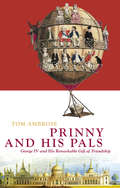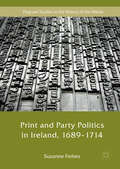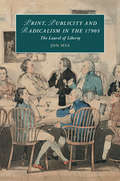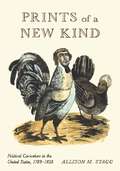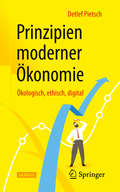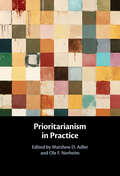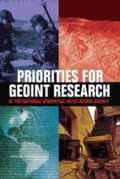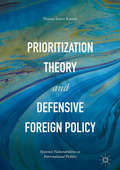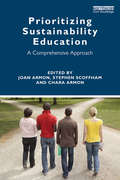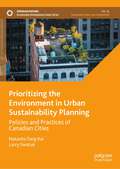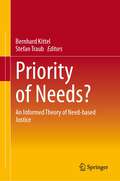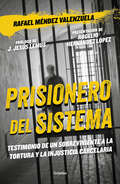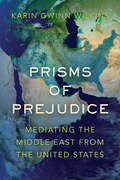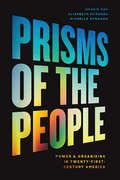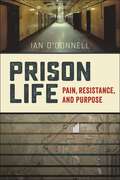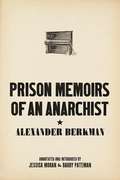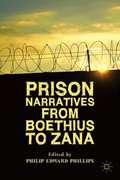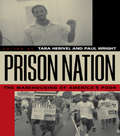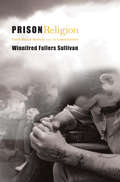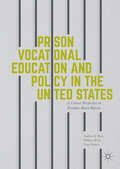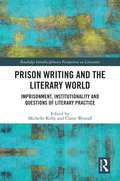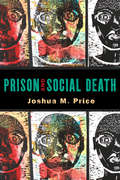- Table View
- List View
Prinny and His Pals: George IV and the Remarkable Gift of Royal Friendship
by Tom AmbroseFrom the first biography of George IV in 1831 to the last in 2001, Mad King George's son has commonly been held up to ridicule as a weak, selfish, and incompetent spendthrift, barely tolerated by his ministers, loathed by most of his family, and dependent on the emotional support of grasping mistresses. However, acclaimed historian Tom Ambrose--author of Godfather of the Revolution: The Life of Phillipe Egalité, Duc D'Orléans--has uncovered new details on "Prinny" that suggests that, for all his faults, George IV just may have been the most humane and amusing of all British monarchs, notwithstanding his love of the high life. Central to the story is the vast array of friends that populate a remarkable reign as Prince Regent and King. If Prinny, as they knew him, was so grotesquely foolish, how did he amass such a fascinating (and loyal) group of friends? Could any other British ruler count among his friends the country's most brilliant playwright (Richard Sheridan), or the wiliest statesman (Charles Fox), or the greatest political philosopher (Edmund Burke), not to mention perhaps the biggest loveable rogues' gallery London ever saw? The truth was that Prinny's occasional buffoonery and imposing girth made him the perfect target for political satirists and cartoonists--at their zenith during his reign--and his high qualities have been consistently overlooked. This warm, funny, and affectionate portrait displays George at his very best: delighting some of the finest minds of his generation, easily winning over his subjects and his family as well as treating his lovers with care and concern--and roistering with all his pals.
Print and Party Politics in Ireland, 1689-1714 (Palgrave Studies in the History of the Media)
by Suzanne ForbesThis book is the first full-length study of the development of Irish political print culture from the Glorious Revolution of 1688-9 to the advent of the Hanoverian succession in 1714. Based on extensive analysis of publications produced in Ireland during the period, including newspapers, sermons and pamphlet literature, this book demonstrates that print played a significant role in contributing to escalating tensions between tory and whig partisans in Ireland during this period. Indeed, by the end of Queen Anne’s reign the public were, for the first time in an Irish context, called upon in printed publications to make judgements about the behaviour of politicians and political parties and express their opinion in this regard at the polls. These new developments laid the groundwork for further expansion of the Irish press over the decades that followed.
Print and Public Politics in the English Revolution
by Jason PeaceyThis is a major reassessment of the communications revolution of the seventeenth century. Using a wealth of archival evidence and the considerable output of the press, Jason Peacey demonstrates how new media - from ballads to pamphlets and newspapers - transformed the English public's ability to understand and participate in national political life. He analyses how contemporaries responded to political events as consumers of print; explores what they were able to learn about national politics; and examines how they developed the ability to appropriate a variety of print genres in order to participate in novel ways. Amid structural change and conjunctural upheaval, he argues that there occurred a dramatic re-shaping of the political nation, as citizens from all walks of life developed new habits and practices for engaging in daily political life, and for protecting and advancing their interests. This ultimately involved experience-led attempts to rethink the nature of representation and accountability.
Print, Publicity, and Popular Radicalism in the 1790s: The Laurel of Liberty (Cambridge Studies in Romanticism)
by Jon MeeJon Mee explores the popular democratic movement that emerged in the London of the 1790s in response to the French Revolution. Central to the movement's achievement was the creation of an idea of 'the people' brought into being through print and publicity. Radical clubs rose and fell in the face of the hostile attentions of government. They were sustained by a faith in the press as a form of 'print magic', but confidence in the liberating potential of the printing press was interwoven with hard-headed deliberations over how best to animate and represent the people. Ideas of disinterested rational debate were thrown into the mix with coruscating satire, rousing songs, and republican toasts. Print personality became a vital interface between readers and print exploited by the cast of radicals returned to history in vivid detail by Print, Publicity, and Popular Radicalism in the 1790s. This title is also available as Open Access.
Prints of a New Kind: Political Caricature in the United States, 1789–1828
by Allison M. StaggPrints of a New Kind details the political strategies and scandals that inspired the first generation of American caricaturists to share news and opinions with their audiences in shockingly radical ways. Complementing studies on British and European printmaking, this book is a survey and catalogue of all known American political caricatures created in the country’s transformative early years, as the nation sought to define itself in relation to European models of governance and artistry.Allison Stagg examines printed caricatures that mocked events reported in newspapers and politicians in the United States’ fledgling government, reactions captured in the personal papers of the politicians being satirized, and the lives of the artists who satirized them. Stagg’s work fills a large gap in early American scholarship, one that has escaped thorough art-historical attention because of the rarity of extant images and the lack of understanding of how these images fit into their political context. Featuring 125 images, many published here for the first time since their original appearance, and a comprehensive appendix that includes a checklist of caricature prints with dates, titles, artists, references, and other essential information, Prints of a New Kind will be welcomed by scholars and students of early American history and art history as well as visual, material, and print culture.
Prinzipien moderner Ökonomie: Ökologisch, ethisch, digital
by Detlef PietschDie moderne Ökonomie befindet sich in einem tiefgreifenden Wandel. Während schon seit geraumer Zeit der Kapitalismus als Wirtschaftsform massiver Kritik ausgesetzt ist, stellen sich, ausgelöst durch die jüngsten Ereignisse rund um die Corona-Pandemie, weitere grundlegende Fragen an die Ökonomie: Wie viel Staat und wie viel Markt braucht sie? Hält die moderne Ökonomie für die Ökologie die richtigen Antworten bereit? Hat sie ein Rezept für die zunehmende Ungleichheit in unserer Gesellschaft und wie sieht es zukünftig mit unserem Wohlstand aus? Ist die heutige Ökonomie auf die Auswirkungen der Digitalisierung ausreichend vorbereitet und welchen Beitrag liefert die ökonomische Theorie zu allen diesen Themen? Das sind die wichtigsten Fragen, die dieses Buch beantworten will. Gerade die dramatische Krise des Jahres 2020 hat gezeigt, dass die Wirtschaft mit ihren Akteuren und Unternehmen ohne den Staat nicht alleine existieren kann. Gigantische staatliche Rettungsschirme in dreistelliger Milliardenhöhe von EU, Bund und Ländern haben wesentliche Teile der Wirtschaft vor dem sicheren Ruin bewahrt. Es scheint, dass wir wesentliche Grundfragen unserer modernen Wirtschaft neu hinterfragen müssen. Nachdem Detlef Pietsch in seinem letzten Buch “Eine Reise durch die Ökonomie“ vor allem die ökonomische Vergangenheit und ihre Kernideen erläutert hat, widmet er sich nun der Gegenwart. Spannend zu lesen, lehrreich und regt zum Nachdenken über die heutige Ökonomie an.
Prioridades na negociação de adesão da Roménia à UE: Integração europeia
by Perju GenovevaA competitividade das exportações romenas melhorou tanto como resultado da reestruturação da economia como da desvalorização da moeda. O exemplo da produção industrial é ilustrativo. A produção da indústria de processamento diminuiu com 8% em 1999 face a 1998, a sua participação em exportações aumentando de 30,7% a 35,1%, e a taxa de crescimento das exportações foi de 5,9%. O efeito principal foi uma redução do défice da conta corrente. Em geral, o défice da conta corrente flutuou, representando, em média, 5,2% de PIB. O défice orçamentário foi difícil de controlar, mas conseguiu-se através da aplicação dos rigores da União Européia. Podemos falar sobre desempenhos também em termos do nível da dívida externa em relação ao nível da dívida externa da União, que se situa em um nível mais elevado em comparação com o de outros países candidatos. O mercado de trabalho foi afetado por desequilíbrios, tanto no nível da relação entre a população ativa e a inativa, quanto na taxa de emprego. A população ocupada na agricultura detêm aproximadamente 40% do total da população ocupada. Além disso, uma grande parte da população foi afectada pela pobreza (aproximadamente 33,8%), em especial a população do meio rural (40,5%). Num tal quadro interno e internacional, marcado por interdependências com ecos em plano interno da União ou dos países candidatos, a resolução de situações divergentes ou a eliminação dos obstáculos no caminho de assumir certas obrigações e execícios da vontade política, a qualidade e a experiência do negociador podem ser consideradas decisivas para a continuação da cooperação.
Prioritarianism in Practice
by Matthew D. Adler Ole F. NorheimPrioritarianism is an ethical theory that gives extra weight to the well-being of the worse off. In contrast, dominant policy-evaluation methodologies, such as benefit-cost analysis, cost-effectiveness analysis, and utilitarianism, ignore or downplay issues of fair distribution. Based on a research group founded by the editors, this important book is the first to show how prioritarianism can be used to assess governmental policies and evaluate societal conditions. This book uses prioritarianism as a methodology to evaluate governmental policy across a variety of policy domains: taxation, health policy, risk regulation, education, climate policy, and the COVID-19 pandemic. It is also the first to demonstrate how prioritarianism improves on GDP as an indicator of a society's progress over time. Edited by two senior figures in the field with contributions from some of the world's leading economists, this volume bridges the gap from the theory of prioritarianism to its practical application.
Priorities For Geoint Research At The National Geospatial-intelligence Agency
by National Research Council of the National AcademiesThe National Geospatial-Intelligence Agency (NGA) provides geospatial intelligence (GEOINT) to support national security, both as a national intelligence and a combat support agency. In the post-9/11 world, the need for faster and more accurate geospatial intelligence is increasing. GEOINT uses imagery and geospatial data and information to provide knowledge for planning, decisions, and action. For example, data from satellites, pilotless aircraft and ground sensors are integrated with maps and other intelligence data to provide location information on a potential target. This report defines 12 hard problems in geospatial science that NGA must resolve in order to evolve their capabilities to meet future needs. Many of the hard research problems are related to integration of data collected from an ever-growing variety of sensors and non-spatial data sources, and analysis of spatial data collected during a sequence of time (spatio-temporal data). The report also suggests promising approaches in geospatial science and related disciplines for meeting these challenges. The results of this study are intended to help NGA prioritize geospatial science research directions.
Prioritization Theory and Defensive Foreign Policy
by Hanna Samir KassabThis book studies systemic vulnerabilities and their impact on states and individual survival. The author theorizes that the structure of the international system is a product of the distribution of capabilities and vulnerabilities across states. States function or behave in terms of these systemic threats. The author examines a number of specific case-studies focusing on military, economic, environmental, political and cyber vulnerabilities, and how different states are impacted by them. Arguing that current attempts to securitize these vulnerabilities through defensive foreign policies are largely failing, the books makes the case for prioritizing economic development and human security.
Prioritizing Sustainability Education: A Comprehensive Approach
by Stephen Scoffham Joan Armon Chara ArmonPrioritizing Sustainability Education presents theory-to-practice essays and case studies by educators from six countries who elucidate dynamic approaches to sustainability education. Too often, students graduate with exploitative, consumer-driven orientations toward ecosystems and are unprepared to confront the urgent challenges presented by environmental degradation. Educators are prioritizing sustainability-oriented courses and programs that cultivate students’ knowledge, skills, and values and contextualize them within relational connections to local and global ecosystems. Little has yet been written, however, about the comprehensive sustainability education that educators are currently designing and implementing, often across or at the edges of disciplinary boundaries. The approaches described in this book expand beyond conventional emphases on developing students’ attitudes, knowledge, and behaviors by thinking and talking about ecosystems to additionally engaging students with ecosystems in sensory, affective, psychological, and cognitive dimensions, as well as imaginative, spiritual, or existential dimensions that guide environmental care and regeneration. This book supports educators and graduate and upper-level undergraduate students in the humanities, social sciences, environmental studies, environmental sciences, and professional programs in considering how to reorient their fields toward relational sustainability perspectives and practices.
Prioritizing the Environment in Urban Sustainability Planning: Policies and Practices of Canadian Cities (Sustainable Development Goals Series)
by Larry Swatuk Natasha Tang KaiThis book examines the extent to which the environment is addressed in the sustainability plans of Canadian cities. It assesses if and to what extent select leading environmental priorities are addressed in the sustainability plans of sixteen Canadian cities, followed by analysis of efforts towards each priority. It scores and ranks cities against each environmental priority and highlights what makes some cities lead and others lag in environmental sustainability.The book unravels the complexity, similarities, and differences in environmental sustainability planning across major cities in Canada. The project reflects what’s working, who’s leading, and which environmental priorities support the sustainable city model. Climate change has exacerbated the impacts of flood, droughts, wildfire and storms, urban centers must account for sustainability to mitigate and adapt to a changing and uncertain landscape. It begins with robust and integrative sustainability plans that prioritize the environment. This book will make a timely contribution to the on-going debate regarding the ways and means to become a sustainable city. It reflects the on-going sustainable development discourse and deliberations to meet the Sustainable Development Goals. It cut across many SDGs in particular SDG 11, Sustainable Cities and Communities. What makes this study unique is its special attention to environmental priorities within urban sustainability planning. This subject is topical and would appeal to both scholars and practitioners at local, regional, national, and global scales.
Priority of Needs?: An Informed Theory of Need-based Justice
by Bernhard Kittel Stefan TraubThis book develops an empirically informed normative theory of need-based justice, summarizing core findings of the DFG research group FOR2104 “Need-based Justice and Distributive Procedures”. In eleven chapters scholars from the fields of economics, political science, philosophy, psychology, and sociology cover the identification and rationale of needs, the recognition and legitimacy of needs, the dynamics and stability of procedures of distributions according to needs, and the consequences and sustainability of need-based distributions. These four areas are studied from the perspective of two mechanisms of need objectification, the social objectification by the discursive generation of mutual understanding (transparency) and the factual objectification by the transfer of decisions to uninvolved experts (expertise). The volume addresses academics in the fields of justice research, ethics, political theory, social choice and welfare, framing, individual and group decision making, inequality and redistribution, as well as advanced students in the contributing disciplines.
Prisionero del sistema: Testimonios de un sobreviviente a la tortura y la injusticia carcelaria
by Rafael Méndez ValenzuelaLa historia de un joven que estuvo encarcelado injustamente desde sus 20 años hasta sus 33 y de cómo venció al sistema para quedar libre. En enero de 2008 Rafael Méndez Valenzuela fue detenido en el Estado de México. Agentes federales y militares lo obligaron a firmar una declaración en la que reconocía que formaba parte del grupo criminal La Familia. Tras 10 años en prisión, y al existir una denuncia por tortura, un tribunal federal ordenó la reposición del proceso para mantenerlo preso en lo que se investigaban los hechos, aun cuando el afectado ya había cumplido su sentencia en la cárcel. Ante la suma de injusticias, su madre, la periodista Judith Valenzuela, se acercó a distintas instancias judiciales y asociaciones de derechos humanos sin mayor éxito. Fue hasta que acudió a la conferencia mañanera presidencial, donde expuso el caso, que logró que López Obrador instara a la Secretaría deGobernación y a la Suprema Corte de Justicia a revisar el caso para que Rafael por fin fuera liberado. Con una prosa contundente que quita el aliento, Prisionero del sistema es el relato de la lucha de Rafael y su madre en contra de un sistema jurídico podrido, anacrónico. A lo largo de sus páginas descubrimos cómo la impartición de justicia en México somete a personas arbitrariamente y facilita la ilegalidad y la degradación humana de todos los que la integran: agentes policiacos, militares, ministerios públicos, jueces, gobernantes y sobre todo presos inocentes que pocas veces logran salir del infierno para rehacer su vida. Palabras de la crítica «Rafael nos lleva de la mano, a veces con susurros, a veces con gritos de desesperanza, por los vericuetos del aparato judicial mexicano, al que expone y desnuda hasta la vergüenza. Es la voz de cientos, tal vez miles, de presos que no han tenido la oportunidad de contar sus casos de injusticia.» -Jesús Lemus l
Prisms of Prejudice: Mediating the Middle East from the United States
by Karin Gwinn WilkinsMedia do not reflect: media refract. In the United States, established and enduring prisms of prejudice about the projected "Middle East" are mediated through popular culture, broadcast news, government mission statements and official maps. This mediation serves to assert political boundaries and construct the United States as heroic against a villainous or victimized Middle East. These problematic maps and narratives are persistent over time and prevalent across genre, with clear consequences evidenced by the rise in discriminatory sentiments in the US population and experiences of harm in US Arab and Muslim communities. Exploring a wide range of media, Karin Gwinn Wilkins illuminates the shape and scope of these narratives and explores ways to counter these prisms of prejudice through informed and engaged strategic intervention in critical communication literacy.
Prisms of the People: Power & Organizing in Twenty-First-Century America (Chicago Studies In American Politics Ser.)
by Hahrie Han Elizabeth McKenna Michelle OyakawaGrassroots organizing and collective action have always been fundamental to American democracy but have been burgeoning since the 2016 election, as people struggle to make their voices heard in this moment of societal upheaval. Unfortunately much of that action has not had the kind of impact participants might want, especially among movements representing the poor and marginalized who often have the most at stake when it comes to rights and equality. Yet, some instances of collective action have succeeded. What’s the difference between a movement that wins victories for its constituents, and one that fails? What are the factors that make collective action powerful?Prisms of the People addresses those questions and more. Using data from six movement organizations—including a coalition that organized a 104-day protest in Phoenix in 2010 and another that helped restore voting rights to the formerly incarcerated in Virginia—Hahrie Han, Elizabeth McKenna, and Michelle Oyakawa show that the power of successful movements most often is rooted in their ability to act as “prisms of the people,” turning participation into political power just as prisms transform white light into rainbows. Understanding the organizational design choices that shape the people, their leaders, and their strategies can help us understand how grassroots groups achieve their goals. Linking strong scholarship to a deep understanding of the needs and outlook of activists, Prisms of the People is the perfect book for our moment—for understanding what’s happening and propelling it forward.
Prison Life: Pain, Resistance, and Purpose
by Ian O'DonnellHow prisons around the world shape the social lives of their inhabitantsPrison Life offers a fresh appreciation of how people in prison organize their lives, drawing on case studies from Africa, Europe and the US. The book describes how order is maintained, how power is exercised, how days are spent, and how meaning is found in a variety of environments that all have the same function – incarceration – but discharge it very differently. It is based on an unusually diverse range of sources including photographs, drawings, court cases, official reports, memoirs, and site visits.Ian O’Donnell contrasts the soul-destroying isolation of the federal supermax in Florence, Colorado with the crowded conviviality of an Ethiopian prison where men and women cook their own meals, seek opportunities to generate an income, elect a leadership team, and live according to a code of conduct that they devised and enforce. He explores life on wings controlled by the Irish Republican Army in Northern Ireland’s H Blocks, where men who saw the actions that led to their incarceration as politically-motivated moved as one, in perpetual defiance of the authorities. He shows how prisoners in Texas took to the courts to overthrow a regime that allowed their routine subjugation by violent men known as building tenders, who had been selected by staff to supervise and discipline their peers.In each case study O’Donnell presents the life story of a man who was molded by, and in return molded, the institution that held him. This ensures that his reflections on law and policy as well as on theory and practice never lose sight of the human angle. Imprisonment is about pain after all, and pain is personal.
Prison Memoirs of an Anarchist
by Barry Pateman Alexander Berkman Jessica Moran"A book of rare power and beauty, majestic in its structure, filled with the truth of imagination and the truth of actuality, emphatic in its declarations and noble in its reach."-Bayard Boyesen, Mother Earth. "No other book discusses so frankly the criminal ways of the closed prison society."- Kenneth RexrothIn 1892, Alexander Berkman tried to assassinate Henry Clay Frick for the latter's role in violently suppressing the Homestead Steel Strike. Berkman's attempt was unsuccessful. Berkman spent the next fourteen years in Pennsylvania's Western Penitentiary. Upon release, he wrote what was to become a classic of prison literature, and a profound testament to human courage in the face of oppression.This new edition of his account of those years is introduced and fully annotated by Barry Pateman and Jessica Moran, both former associate editors of the Emma Goldman Papers at the University of California Berkeley. Their efforts make this the definitive version of Berkman's tale of his transformation within prison, his growing sympathy for those he'd considered social parasites, and the intimate relationships he developed with them. Also includes never-before-published facsimile reprints and transcriptions of the diary Berkman kept while he wrote this book, conveying the difficulties he had reliving his experiences.Alexander Berkman (1870-1936) was a leading writer and militant in the anarchist movement and author of the classic primer What is Anarchism?Barry Pateman was associate editor of Emma Goldman: A Documentary History, and editor of Chomsky on Anarchism. He is a historian and member of the Kate Sharpley Library collective.Jessica Moran, was an assistant editor of Emma Goldman: A Documentary History. She is a member of the Kate Sharpley Library collective and is an archivist currently living and working in New Zealand.
Prison Narratives from Boethius to Zana
by Philip Edward PhillipsPrison Narratives from Boethius to Zana critically examines selected works of writers, from the sixth century to the twenty-first century, who were imprisoned for their beliefs. Chapters explore figures' lives, provide close analyses of their works, and offer contextualization of their prison writings.
Prison Nation: The Warehousing of America's Poor
by Paul Wright Tara HerivelFirst Published in 2003. Routledge is an imprint of Taylor & Francis, an informa company.
Prison Officers: International Perspectives on Prison Work (Palgrave Studies in Prisons and Penology)
by Matthew Maycock Rosemary Ricciardelli Helen ArnoldThis edited collection brings together academics, lawyers, civil servants, and researchers working in the human rights NGO sector, to explore the work and role of prison officers around the world. Each chapter offers a distinctive perspective on the work of prison officers within localised socio-economic and criminal justice contexts, to provide a unique overview and insight into the realities and complexities of the role through accessible scholarly interpretations of their work. The aim of the book is to advance knowledge and understanding of the crucial role that prison officers occupy within carceral systems. The collection has widespread applicability with relevance beyond academia into criminal justice practice and policy internationally.Chapter 3 is available open access under a Creative Commons Attribution 4.0 International License via link.springer.com.
Prison Religion: Faith-Based Reform and the Constitution
by Winnifred Fallers SullivanMore than the citizens of most countries, Americans are either religious or in jail--or both. But what does it mean when imprisonment and evangelization actually go hand in hand, or at least appear to? What do "faith-based" prison programs mean for the constitutional separation of church and state, particularly when prisoners who participate get special privileges? In Prison Religion, law and religion scholar Winnifred Fallers Sullivan takes up these and other important questions through a close examination of a 2005 lawsuit challenging the constitutionality of a faith-based residential rehabilitation program in an Iowa state prison. Americans United for the Separation of Church and State v. Prison Fellowship Ministries, a trial in which Sullivan served as an expert witness, centered on the constitutionality of allowing religious organizations to operate programs in state-run facilities. Using the trial as a case study, Sullivan argues that separation of church and state is no longer possible. Religious authority has shifted from institutions to individuals, making it difficult to define religion, let alone disentangle it from the state. Prison Religion casts new light on church-state law, the debate over government-funded faith-based programs, and the predicament of prisoners who have precious little choice about what kind of rehabilitation they receive, if they are offered any at all.
Prison Vocational Education and Policy in the United States
by Tony Waters Andrew J Dick William RichThis book explores California's prison system in the context of vocational education reform. For prisons in the early twenty-first century, ideologies of evidence-based management meant that reform efforts to change the purpose of prisons from punishment to rehabilitation through vocational education required "evidence" to justify policy prescriptions. Yet who determines what constitutes evidence? In political environments, solutions are typically pre-conceived, which means that the nature of the evidence collected is also preconceived. As a result, key assumptions about outcomes are often wished away to show improvement and be accountable. Through a detailed analysis interspersed with stories from the authors' experiences "behind the wall" among California's prison population, the authors challenge the nature of evidence-based research as used in the prison environment. In the process they describe the thorny problems facing reformers.
Prison Writing and the Literary World: Imprisonment, Institutionality and Questions of Literary Practice (Routledge Interdisciplinary Perspectives on Literature)
by Michelle Kelly and Claire WestallPrison Writing and the Literary World tackles international prison writingand writing about imprisonment in relation to questions of literary representationand formal aesthetics, the “value” or “values” of literature,textual censorship and circulation, institutional networks and literary-criticalmethodologies. It offers scholarly essays exploring prison writingin relation to wartime internment, political imprisonment, resistance andindependence creation, regimes of terror, and personal narratives of developmentand awakening that grapple with race, class and gender. Cuttingacross geospatial divides while drawing on nation- and region-specific expertise,it asks readers to connect the questions, examples and challengesarising from prison writing and writing about imprisonment within theUK and the USA, but also across continental Europe, Stalinist Russia, theAmericas, Africa and the Middle East. It also includes critical reflectionpieces from authors, editors, educators and theatre practitioners with experienceof the fraught, testing and potentially inspiring links between prisonand the literary world.
Prison and Social Death
by Joshua M. PriceThe United States imprisons more of its citizens than any other nation in the world. To be sentenced to prison is to face systematic violence, humiliation, and, perhaps worst of all, separation from family and community. It is, to borrow Orlando Patterson's term for the utter isolation of slavery, to suffer "social death." In Prison and Social Death, Joshua Price exposes the unexamined cost that prisoners pay while incarcerated and after release, drawing upon hundreds of often harrowing interviews conducted with people in prison, parolees, and their families. Price argues that the prison separates prisoners from desperately needed communities of support from parents, spouses, and children. Moreover, this isolation of people in prison renders them highly vulnerable to other forms of violence, including sexual violence. Price stresses that the violence they face goes beyond physical abuse by prison guards and it involves institutionalized forms of mistreatment, ranging from abysmally poor health care to routine practices that are arguably abusive, such as pat-downs, cavity searches, and the shackling of pregnant women. And social death does not end with prison. The condition is permanent, following people after they are released from prison. Finding housing, employment, receiving social welfare benefits, and regaining voting rights are all hindered by various legal and other hurdles. The mechanisms of social death, Price shows, are also informal and cultural. Ex-prisoners face numerous forms of distrust and are permanently stigmatized by other citizens around them. A compelling blend of solidarity, civil rights activism, and social research, Prison and Social Death offers a unique look at the American prison and the excessive and unnecessary damage it inflicts on prisoners and parolees.
